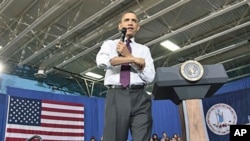U.S. President Barack Obama said he is "optimistic" and "hopeful" that American political leaders can reach an agreement to cut the nation's $14 trillion debt level by $4 trillion over the next decade or so.
The president, a Democrat, said Tuesday that the nation needs to adopt a spending plan for the coming years that is "fair with shared sacrifices," including higher taxes for wealthy Americans. His renewed call for increased taxes is at odds with a competing budget proposal supported by opposition Republicans, but he said he believes the two parties "can come together to get this done."
Obama, speaking to college students at a school just outside Washington, acknowledged that negotiations over cutting the nation's burgeoning long-term debt "won't be easy."
But he said it is "a good sign" that leaders of both parties agree on the need to trim the country's deficit spending while reducing its long-term debt level. The president said "we need to live within our means while strengthening our future" through increased spending for clean energy programs and educational programs.
Earlier, the U.S. treasury secretary, Timothy Geithner, said there is a "broad consensus" emerging on the need for debt reduction.
Geithner told the CNBC television channel that "the chances are better today" than they have been in a long time to lock in "credible targets" for debt reduction. He said it is necessary for the debt burden to start to decline so that the country's economic long-term growth prospects improve.
Geithner said he disagreed with the Standard & Poor's downgrade on Monday of the U.S. economic outlook from "stable" to "negative." He said the U.S. is a younger country than others with the "Triple-A" credit rating and that its commitment for various social welfare programs is less than in other countries with the same top rating.
But he warned that the U.S. must act to start its debt reduction. Geithner said that continuing to borrow 40 cents of every dollar it spends is "completely unsustainable."
Congressional Republicans and the White House have proposed competing debt-reduction plans.
Republicans in the House of Representatives have approved a far-reaching 2012 budget that would cut spending by $6 trillion over the next decade, partly by revamping and trimming government spending on health care for the elderly and poor. Obama has suggested a mix of spending cuts, as well as increasing taxes on the nation's wealthy.
China, which holds more U.S. Treasury bonds than any other investor, urged the U.S. to adopt "responsible policies" to trim its debt level to "safeguard investors' interests."
Stock exchanges across Asia endured selloffs on Tuesday amid investor anxiety over the S&P downgrade of the U.S. economic outlook.
Tokyo's main Nikkei index dropped nearly 1.25 percent by the close of the trading day, while Hong Kong's main index, the Hang Seng, lost 1.3 percent. Share prices in Shanghai, Sydney and Seoul also fell in response to Monday's downgrade.
S&P lowered the U.S. outlook over concerns the Obama administration and congressional lawmakers will not be able to agree on how to reduce the country's massive debt. The agency signaled it could cut the country's top-ranked credit rating within two years.
That would lead to higher borrowing rates for the U.S. government, as similar credit rating downgrades have for debt-ridden European governments.
Some information for this report was provided by AP and AFP.




